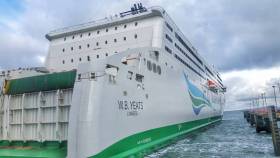Displaying items by tag: Maritime Union
The National Union of Rail, Maritime and Transport (RMT) in the UK, has responded to the prospect that P&O Ferries is to end the jobs of 60 workers.
As Riviera News reports, the ferry operator has said that the proposals do not affect those below leadership level in any of its operations using ports in the UK, Ireland and Europe or any colleagues aboard its ferries.
Mick Lynch, the general secretary of RMT said in a statement, “This is another shameful chapter in the history of P&O Ferries where yet again they show scant regard for the livelihoods of their workforce.”
P&O is considering in cutting 60 UK jobs and follows last year's mass sacking of almost 800 seafarers which also drew political criticism on both sides of the Irish Sea.
The company added they are consulting with colleagues and trade unions about the proposed changes to its management structure. As Afloat also reported, last month the RMT held a rally in Dover on the 1st anniversary of the firings to ferry and shore-based personnel.
Mr Lynch said, "Another 60 job losses comes on the back of introducing new vessels to its fleet at a cost of over £200m (US$249m). Over the past 12 months, this company has demonstrated no loyalty or commitment to its workforce or local economies in the ports in which it operates while jeopardising the safety of travelling passengers.”
More here on the operator that has a route network including the Irish Sea where it serves the Dublin-Liverpool and Larne-Cairnryan routes.
UK Maritime Union Steps Up Campaign Against RoRo Freight and Passenger Ferry Operators
#ferries - A UK transport union is continuing its programme of objections to ferry and other shipping operators who sail under flags of convenience and skirt around UK employment laws and rates of pay with a protest which will take place this Friday, at Holyhead Port, Anglesey in north Wales.
The protest by the National Union of Rail, Maritime and Transport Workers (RMT), according to HandyShippingGuide is to commence at 06:30 hours and targeting the 08:25 sailing of the Irish Ferries RoRo freight and passenger ferry WB Yeats, is to demand seafarer jobs, enforcement of employment law and trade union rights according to the union.
The €144 million luxury vessel (made a delivery voyage to Dublin Port) in December and (last month entered service) is registered under the Cypriot flag which has incensed the union.
For further reading on this ferry development, click here
Afloat adds the sailing targeted does not tally with W.B. Yeats roster, as according to the Irish Ferries website the ropax Epsilon is to depart Holyhead at the slightly earlier time of 08.15. While on that morning W.B. Yeats will notably be on the other side of the Irish Sea with a scheduled departure from Dublin at 08.05hrs.






























































